BizTalk operations are often designed to use an internal message representation, a canonical, for disparate data that represents the same logical piece of information. For example different trading partners might submit different Purchase Order formats, which are then transformed into Purchase Order canonical messages so that BizTalk services can process them consistently.
Sometimes there are other reasons for using a canonical such as the need to enrich the data (status, approvals, context metadata, etc) or to transform the message from non-Xml flat text data.
I recently worked on a project that involved processing many different types of messages. The schemas involved were anything from simple free text messages to well defined messages with both organized content and free form text. While the messages where physically different they all had a common business context. If there had been only a few different messages then a direct schema implementation might have been indicated, however we had almost 100 different message types and different services might subscribe to one or more of them. So, we needed a single canonical to easily represent any one of these different messages. This would also make the subscription/filter configuration easier to maintain and deploy.
How did we implement a single canonical schema to easily represent one of many different messages? The first idea was to try to normalize all the different fields in all the different messages and add the fields to the canonical. This works but the downside is that every time a message type is added or changed, the canonical would have to be updated. Another downside is that structurally it is difficult to organize the canonical schema to make sense from a business perspective and one looses the ability to eyeball the schema and understand where the data is coming from and how it is grouped.
We implemented our solution using Xml Complex Types and the resulting canonical schema required no updating if a message type was added or changed. First we created a base message content complex type from which all other content would be derived. Next we reviewed all the messages and decided how they might be organized from a business perspective. Next, we created the individual content by extending the base message type. Lastly, instead of adding individual messages to the canonical, we simply added the base message content complex type.
The screen shots below depict a schema for a fictional shipping company. Note; the project artifacts are simplified for discussion purposes.
The screenshot below shows the Air Content schema, which contains all the content types associated with shipping by air.
The Transport Canonical schema is shown below. The “Content” node is assigned the base content type. Since all the individual Ground, Air and Uplink content types are derived from the base type they are automatically part of the canonical schema. Note the Xml equivalent node; it contains all of the derived message types from the base Xml complex data type. From MSDN;
“Equivalent nodes are created automatically by BizTalk Editor to show how derived complex types can be used instead of the base complex type from which they are derived wherever the base complex type is called for in the schema. This yields the same type of polymorphism that is common in many object-oriented programming languages.”
The “Content” record properties.
Below is a screenshot of a canonical instance for the Air Weather Request message. During mapping we could easily map the name of the message to a promoted property (TransportMessageTypeId) if required.

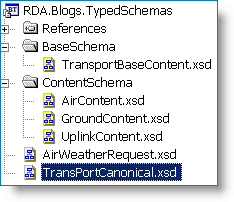
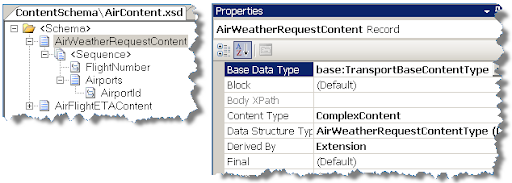
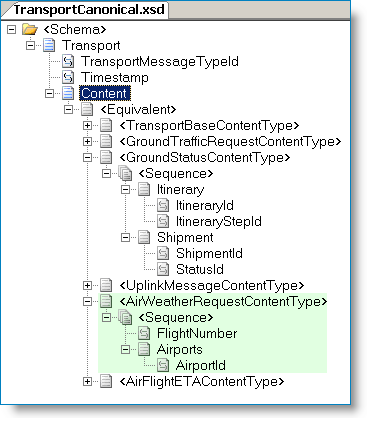
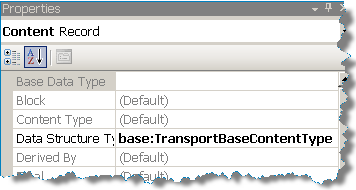
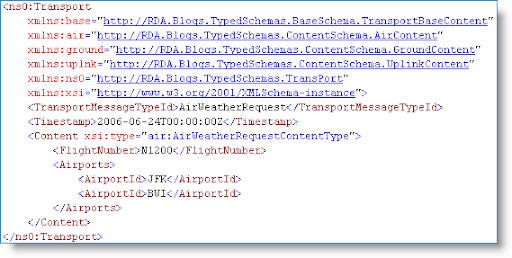


No comments:
Post a Comment